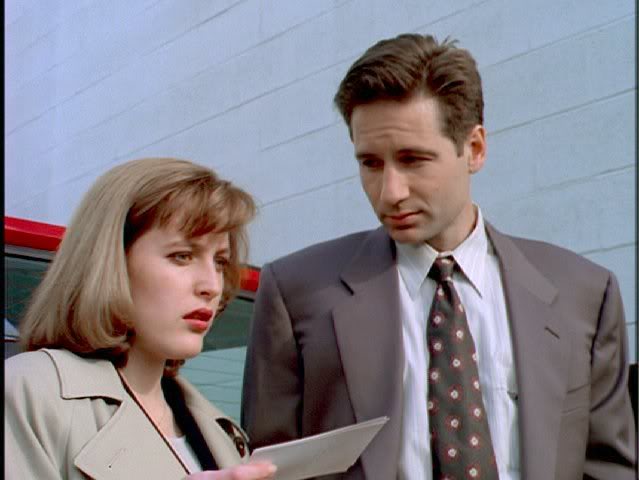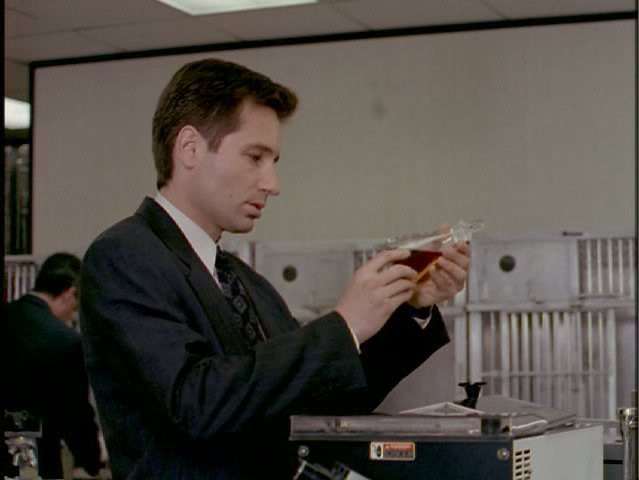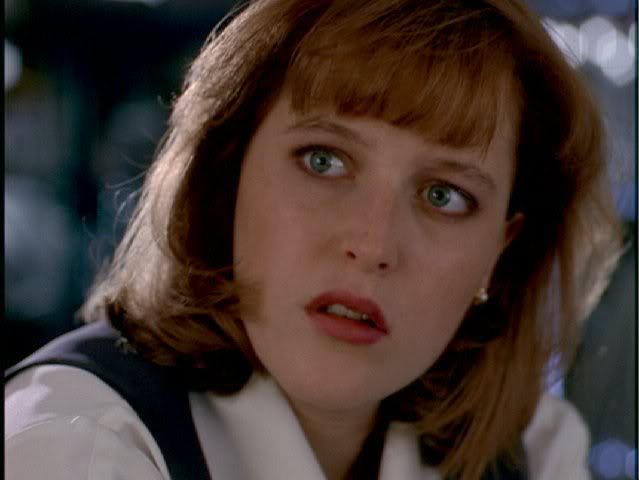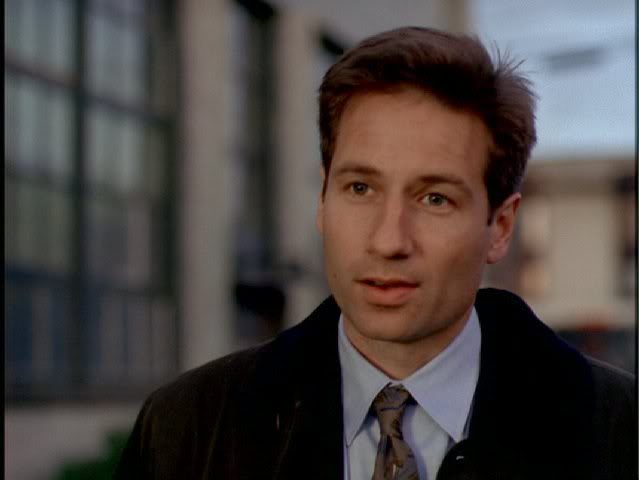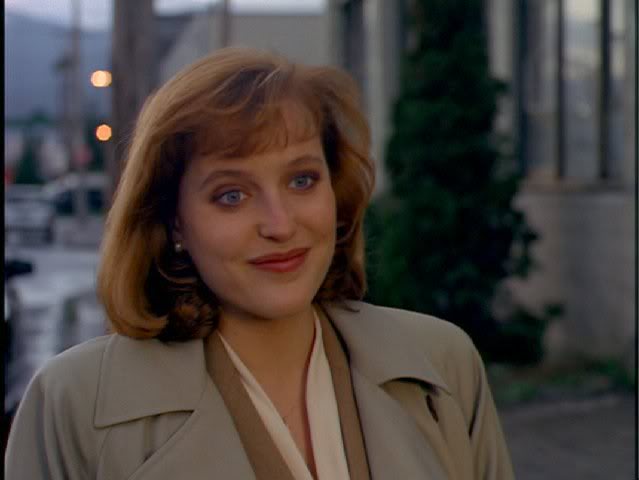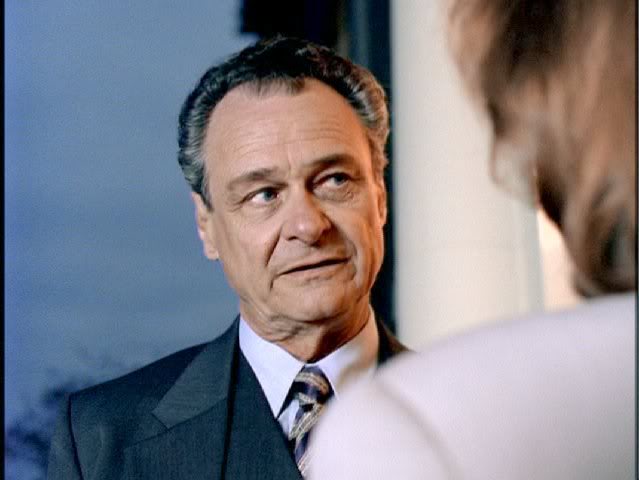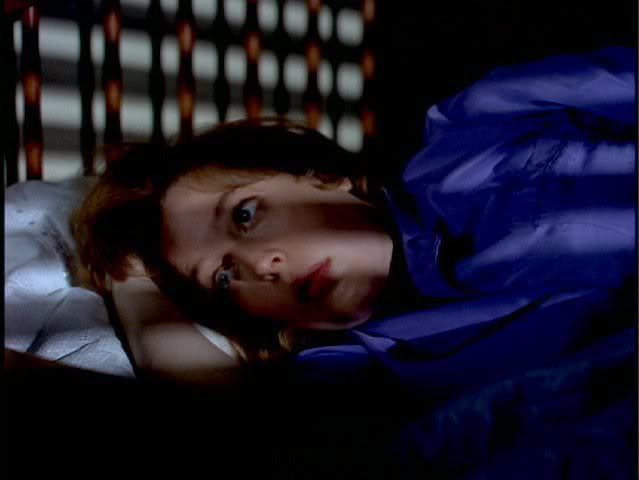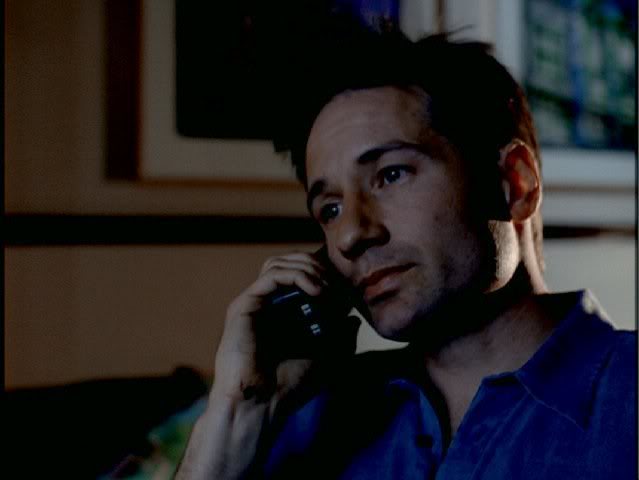CTP Episode of the Day - 11.24.06 – The Erlenmeyer Flask
Today's Cherished Episode: The Erlenmeyer Flask (1x23)
Original Air Date: May 13, 1994
Written By: Chris Carter
Directed By: R. W. GoodwinWorking on a tip from Deep Throat, Mulder and Scully discover that the government has been testing alien DNA on humans with disastrous results.
"You know, I've always held science as sacred. I've ... I've always put my trust in the accepted facts. And what I saw last night ... for the first time in my life, I don't know what to believe."
"Well, whatever it is you do believe, Scully, when you walk into that room ... nothing sacred will hold."
Some "The Erlenmeyer Flask" Tidbits & Musings:
-- Title -- An "Erlenmeyer Flask" is a conical laboratory flask with a narrow neck and flat, broad bottom, named for Richard August Carl Emil Erlenmeyer (1925 - 1909), German chemist. In this episode, Scully was afraid it contained "monkey pee."
-- The series gets its very first tagline change. The familiar "The Truth is Out There" was changed to "Trust No One." This phrase was spoken by Deep Throat with his dying breath.
-- The movie that Mulder was watching in his apartment was the 1959 film Journey to the Center of the Earth. The movie was directed by Henry Levin and based on the classic novel by Jules Verne.
-- When Mulder contacted Danny, the numbers he dialed on the phone played Mary Had a Little Lamb.
-- Danny speaks! This episode marked the first time -- and the last time -- viewers heard Mulder's FBI contact Danny speak.
-- Zeus Storage, 1616 Pandora Street: According to Greek classical religion, Pandora was the first woman. Zeus, the king of the gods, was angered because Prometheus stole fire and gave it to mankind. Zeus ordered the gods to create a woman as a punishment for mankind. Pandora is credited (or blamed) for opening a box and releasing a host of troubles on the world.
-- 1013 reference: The room containing the people in tanks was behind door number 1056, Chris Carter's birth month and year.
-- "The Erlenmeyer Flask" was the only time Mulder's apartment building had a "buzz-in" entrance system.
-- The alien fetus was being kept at the High Containment Facility at Fort Marlene. While there is no real-life Fort Marlene, there is a Fort Dietrich in Maryland -- a site known for its experimentation with biological weapons. The first name of another famous "Dietrich" was used for the name of the Fort.
-- Marlene Dietrich was an Academy-Award nominated German-American actress, entertainer, and singer. She was born in Germany and moved to Hollywood in the 1930s to pursue a film career. In 1937, when her film career stalled in the U.S., she went to London to make a film. While there, she was approahced by representatives of the Nazi party to return to Germany, but turned them down flat. Her U.S. film career was revived with the Western Destry Rides Again with Jimmy Stewart. When the U.S. entered World War II in 1941, Dietrich became one of the first celebrities to raise war bonds. She was known to have strong political convictions and the mind to speak them, and was a staunch anti-Nazi who despised anti-Semitic policies of National Socialism. Dietrich entertained troops on the front lines in Algiers, France, and into Germany in a USO revue that included future TV pioneer Danny Thomas as her opening act. When asked why she had done this, in spite of the obvious danger, she replied, "It was the decent thing to do." Dietrich was awarded the Medal of Freedom by the U.S. Government for her war work.
-- The main hallway of Fort Marlene was later recycled into the FBI's main hallway.
-- When Jerry Hardin (Deep Throat) received his copy of "The Erlenmeyer Flask" script, a note from series creator Chris Carter was attached to it. The note read: "Nobody ever dies on The X-Files."
-- Hardin thought perhaps the decision to kill off his character of Deep Throat was because he had expressed a desire to gain a more regular appearance schedule on the show. But according to Chris Carter, the decision was made because he wanted to establish that, other than perhaps the leads, "everyone was expendable" on the series -- a way of keeping viewers guessing as to what twists and turns might occur.
-- Hardin recalled that his death scene was the sort of big dramatic moment "you want to take your time on and get perfect. The truth of the matter was, we were fighting the light like crazy" to get the shot completed in time before the sun came up. "It was about to be dawn," he recalled.
-- Chris Carter lived up to his word and brought Hardin back for periodic guest appearances, beginning with Season 3's "The Blessing Way," and Hardin was always glad to oblige. "I like to think it was because the fans wanted me back," he said. "It was remarkable how many of the people want to meet Deep Throat. When you come right down to it, in the seven episodes I did [in Season One], there was probably no more than three or four minutes at a time, so I take it as a great compliment."
-- Hardin's dying words to Agent Scully stuck with the show's viewers. He says with some pride that when he's met with fans, "People by the hundreds ask me to sign 'Trust no one,' and I have to assume that my delivery of that line made it something that they felt strongly about, and that they connected strongly with that character."
-- The ending of this episode mirrored the ending of the "Pilot." Mulder called Scully at 11:21 (Chris Carter's wife's birth date), and the Smoking Man stored proof of alien existence deep within the Pentagon.
-- "Gillian Anderson came to me in the second half of the first season to tell me that she was pregnant," recalled Chris Carter. "There were many thoughts about how we should handle the pregnancy — alien baby being one of them. Ultimately I think we all kind of group-decided that what we should do is write around Gillian’s pregnancy, we should not deal with it at all on camera. But at the end of Season One, you could see noticeably that Gillian began to be transformed into the beginning of motherhood."
-- Disbanding the X-Files unit at the end of "The Erlenmeyer Flask" separated Mulder from Scully, providing the means to work around Gillian Anderson's pregnancy through the start of the second season.
-- "The Erlenmeyer Flask" was co-executive producer Bob Goodwin's first directing effort for the series and started a tradition of his directing the first and last episode of each season (except for Season 2's "Little Green Men") until the show left Vancouver. "The Erlenmeyer Flask" was one of his favorite episodes of the entire series.
-- It was also a favorite of Mark Snow, the show's music composer. "It was a big, big show," said Snow. "It was a very exciting score and that was my favorite score."
-- The episode received a nomination for an Edgar Award, an honor presented by the Mystery Writers of America.
-- "The whole idea of the show was really about Mulder's quest to find the truth about his sister and to possibly find his sister," said Chris Carter, summing up the first season. "So, the idea of a mythology is kind of built in to the show because Mulder's quest takes him far and wide and into the paranormal. So I really think of every episode as a mythology episode in a sense, but then there are these episodes that really become about that specific quest, which is the search for his sister, the episodes that involved specifically the truth about alien extraterrestrial life and the possibility that his sister was abducted by aliens."
-- "Mulder's main motivation in Season One was uncovering the secret about his missing sister," added executive producer Howard Gordon, "and that was really, I think, what drove Season One and certainly the entire mythology of the X-Files was the basis that was Samantha Mulder."
-- When Carter wrote "The Erlenmeyer Flask," he didn't know if it would be the season or the series finale. At the end of Season 1, The X-Files was rated 113th out of 132 primetime series. But the audience had been steadily building as the season progressed, and "The Erlenmeyer Flask" attracted more than 8 million viewers, the series' highest rating of the first season. Fox was a fledgling network at the time and the show was doing reasonably well for a Friday night time slot, so Fox decided to renew the series for a second year. They put more advertising dollars behind the show during summer reruns and it paid off: The Season 2 premiere attracted over 10 million viewers.
-- Once & Future Retreads: Lindsey Ginter (Crew Cut Man) played the same role (known as The Cleaner) in "Red Museum." Jim Leard (Captain Roy Lacerio) was Sgt. Al Dixon in "Colony." Ken Kramer (Dr. Terrance Berube) was Dr. Browning in "3" and Dr. Ivanov in "War of the Coprophages." John Payne (Guard) was Jerald Glazebrook in "Humbug."
(Thanks to chrisnu for today's pics.)
Please share your first impressions, favorite (or cringe-worthy) moments, classic lines, favorite fanfic, nagging questions, repeated viewing observations, etc., as today we celebrate "The Erlenmeyer Flask."
Polly
